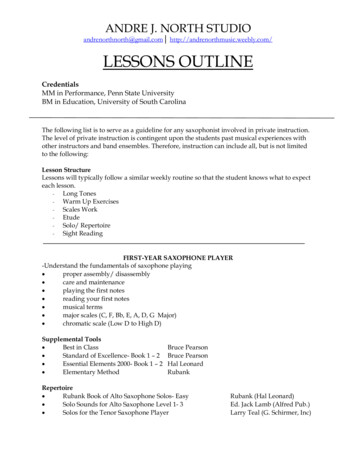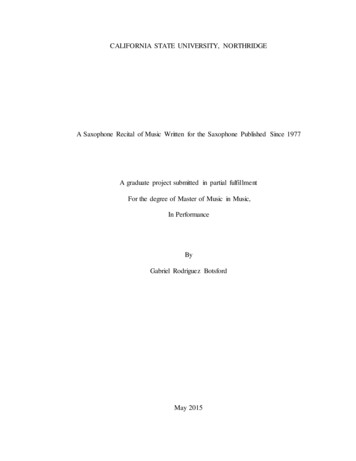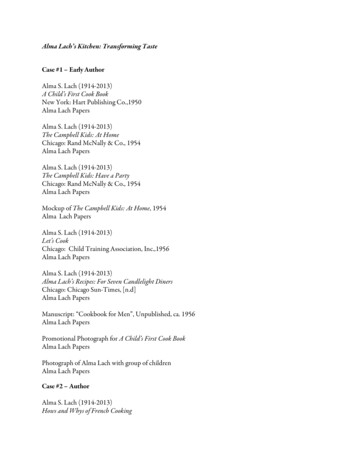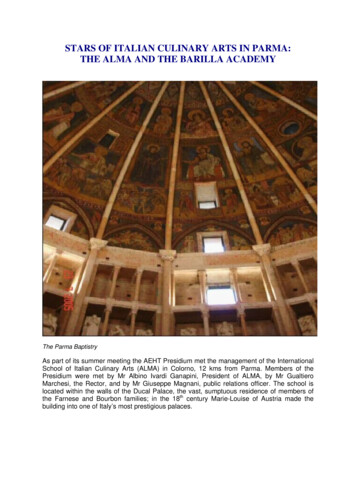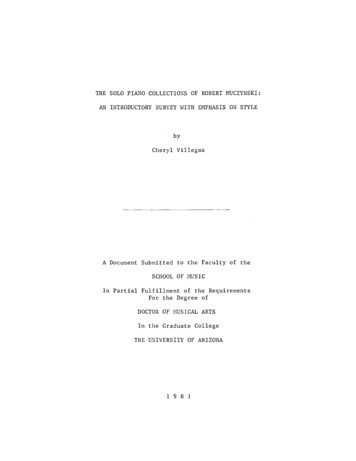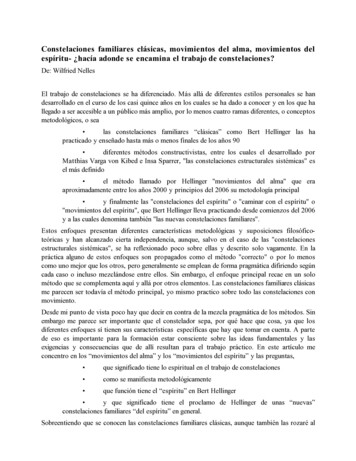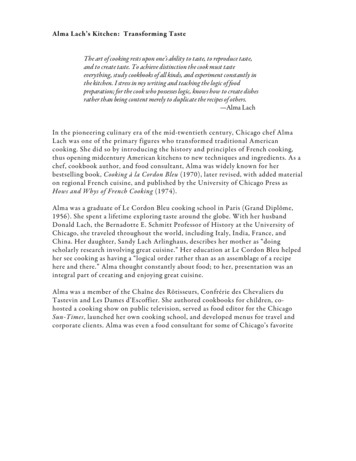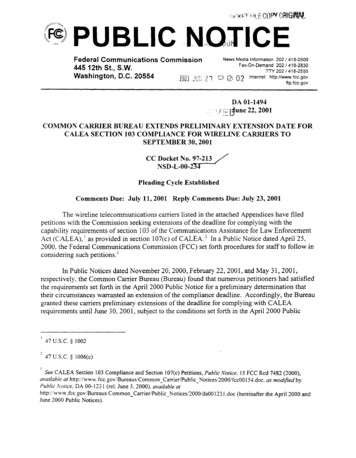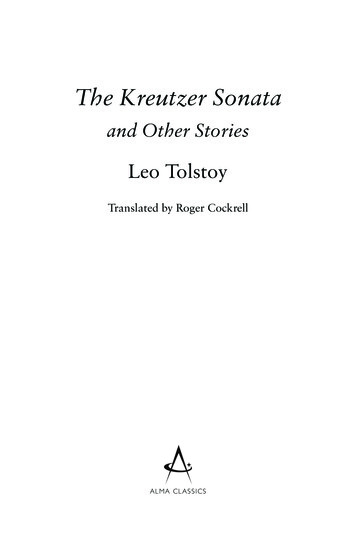
Transcription
The Kreutzer Sonataand Other StoriesLeo TolstoyTranslated by Roger CockrellAL MA CL AS S I CS
alma classicsan imprint ofalma books Ltd3 Castle YardRichmondSurrey TW10 6TFUnited Kingdomwww.almaclassics.comThis collection first published by Alma Classics in 2015Translation and Introduction Roger Cockrell, 2015Extra Material Alma ClassicsCover: Will DadyPrinted and bound by CPI Group (UK) Ltd, Croydon, CR0 4YYisbn: 978-1-84749-411-5All the pictures in this volume are reprinted with permission or pre sumedto be in the public domain. Every effort has been made to ascertain andacknowledge their copyright status, but should there have been anyunwitting oversight on our part, we would be happy to rectify the errorin subsequent printings.All rights reserved. No part of this publication may be reproduced, storedin or introduced into a retrieval system, or transmitted, in any form orby any means (electronic, mechanical, photocopying, recording or otherwise), without the prior written permission of the publisher. This book issold subject to the condition that it shall not be resold, lent, hired out orotherwise circulated without the express prior consent of the publisher.
ContentsIntroduction vThe Kreutzer Sonata and Other Stories The Kreutzer Sonata After the Ball Master and Man The Prisoner of the Caucasus 13109122185Afterword to ‘The Kreutzer Sonata’ Note on the Texts Notes 219237237Extra Material 241Leo Tolstoy’s Life 243Leo Tolstoy’s Works 258Select Bibliography 271
Leo Tolstoy (1828–1910)
Nikolai Ilyich Tolstoy,Tolstoy’s fatherA young Leo Tolstoyin 1848Tolstoy’s wife Sofya with her younger children: left to right, Mikhail(Misha), Andrei (Andryusha), Alexandra (Sasha) and Ivan (Vanechka)
The house in which Leo Tolstoy was bornYasnaya Polyana, where Tolstoy spent most of his life
Notes and sketches made by Leo Tolstoyon the field of the Battle of Borodino
IntroductionIn the opening chapter of his story ‘The Devil’ (published posthumously in 1912), Tolstoy makes the following observation:“People usually think that it is old men who are for the mostpart conservatives, and that it is young men who are innovators.This is not totally correct. Most conservatives are young people– young people who want to live, but who neither think nor havethe time to think how they should live and who therefore take astheir model the life they have always known.” Although Tolstoygoes on to apply this pronouncement to the story’s young hero,Yevgeny Irtenyev, it also offers an illuminating insight into his ownmind and convictions. It reminds us of his delight in challengingreceived opinion, as well as of his lifelong preoccupation with thequestion of how one ought to live. Why was life so important,he asked, if its only goal was the achievement of one’s personalhappiness, and if one lived it just for its own sake without anyregard for its meaning? If, moreover, it is to have a meaning, whatshould be its source, and what possible models could one adoptthat might act as agents of change in one’s life?Such concerns are evident in each of the four stories that appearin this volume. When ‘The Kreutzer Sonata’* was first publishedin 1890, abstract issues of this kind were, however, overshadowedby the immediate impact of this most unusual story. Condemnedas “incoherent, filthy and immoral”* and initially banned by thecensor, the story was approved for publication after a personalappeal by his wife Sonya to the Tsar, but even then only as part ofv
the kreutzer sonata and other storiesa complete edition of his works. This was not merely the inevitablereaction of “less enlightened” times, for ‘The Kreutzer Sonata’still retains the power to shock today. Within just a few pages,readers find themselves pitched into a breath-taking assault onthe decadence, hypocrisy and immorality of upper-class Russiansociety. Dogmatic moralizing on the sins of sexuality and the consequential need for chastity goes hand in hand with the accountof the breakdown of a marriage, which picks over the bones ofa doomed relationship in graphic detail. All the while, the hothouse atmosphere generated within the claustrophobic setting ofa railway carriage is compounded by the unsettling effect of thetrain’s movement over the rails.Whose voice is this? Are these the random ravings of a semideranged individual, or is Pozdnyshev a mouthpiece for Tolstoy’sown opinions? In his ‘Afterword’ to the story, published in 1890 andreproduced here, Tolstoy defends the position taken by Pozdnyshevin considerable detail, making it clear he shares most of his views.But there is one major qualification: whereas Pozdnyshev seesuniversal chastity as an absolute requirement, Tolstoy maintainsthat it should not be a binding precept, but an ideal towardswhich human beings should strive. The fact that it might never beachieved, he argues, does not invalidate it as an idea – quite thecontrary: once people start focusing on the theoretical achievement of an ideal rather than on the process of working towardsit, then it loses its significance.One of the more puzzling aspects of the ‘Afterword’ is theabsence of any reference to music. This seems rather strange: afterall, Tolstoy chose to name his story after a well-known Beethovensonata, and Pozdnyshev’s attack on music’s pernicious effects inChapter 23 is particularly impassioned. The reason for Tolstoy’sreticence may well lie in his own ambivalent attitude, reflectingvi
introductionthe dualism in his character between a deeply ingrained asceticismand an equally profound sensuousness. There are many referencesin his letters and notebooks attesting to his love for music, butthere is often an admixture of fear. For him, as for Pozdnyshev,“purposeless” music such as ‘The Kreutzer Sonata’ seemed topossess erotic and therefore disturbing implications; the more hewas attracted by a piece of music, the more he apparently fearedit, and the more he feared it, the more fiercely he condemned it.The unsettling effect of music on the human psyche is alsoevident in ‘After the Ball’, although here it is expressed withgreater subtlety. The narrator’s inner journey from passionate,unthinking love to conscious disillusionment is paralleled by thestark contrast between the romantic music of the ballroom andthe terrifying whistle of the pipe and beat of the drum – a hauntingly incongruous accompaniment to the flogging of the unfortunate prisoner. Unlike ‘The Kreutzer Sonata’, however, readersare left to come to their own conclusions, thereby increasing theforce of the questions Tolstoy is implicitly asking. How can twosuch contrasting worlds coexist? How can society allow them tocoexist? How can that colonel on the dance floor, with his finemanners and tender, affectionate smile, be the same man as themonster on the parade ground the very next day? “In order to turnsomeone from a human being into a beast,” Tolstoy wrote whileserving in the army in the Caucasus, “you only need to take himaway from his family, put a uniform on him and start beating adrum.”* This exemplary and wonderfully balanced short story,written by Tolstoy when he was in his eighth decade, is testamentto his undiminished ability to startle his readers with the freshnessand clarity of his vision.With ‘Master and Man’ we move into a completely differentmilieu – away from ballrooms, drawing rooms and upper-classvii
the kreutzer sonata and other storiesurban life, and into the apparently unchanging, and certainlymore physically challenging, world of provincial Russia. The plotcentres on the relationship between the “master”, Vasily AndreichBrekhunov, and his servant, Nikita, and their disastrous midwinter journey. ‘Master and Man’ is more openly dogmatic than‘After the Ball’: Tolstoy makes his dislike of Orthodox ritual andhis preference for his own idiosyncratic version of the Gospels veryplain, and the moral of the contrast that emerges between Nikita’scalm acceptance of life’s vicissitudes and Brekhunov’s obsessionwith status and money could hardly be more pointed. For some,Tolstoy’s uncompromising moral stance detracts from the story’sinterest; for others, it is this position which gives ‘Master and Man’the integrity it would otherwise lack. What is not open to question, however, is Tolstoy’s skill in creating such a vividly realizedworld. The disorientating effects of the storm, with its whirlingsnow and buffeting wind, the recurring images of the moaningwillow trees, the mugwort and the frantically flapping line ofwashing assume the characteristics of a nightmare. We ride offtogether with Brekhunov as he dashes away on his mindless bidfor freedom, and the one-to-one relationship between Nikita andthe horse Mukhorty seems the most natural thing in the world.Tolstoy brings each character, however small his or her part, to life,even if only for a moment: think of the horse thief in Grishkino,of the unfailingly cheerful and semi-literate Petrukha, or of thebrowbeaten little pony hobbling through the snow as it strivesto get the party of drunken revellers home. With such instances,the illusion that we are part of a real, rather than fictional, worldbecomes complete.The final story in this collection, ‘The Prisoner in the Caucasus’(1871–72), was Tolstoy’s response to Pushkin’s Byronic poem ofthe same title written some fifty years earlier.* Tolstoy recastsviii
introductionPushkin’s plot by using simple, concise language and by strippingit of any romantic associations: Pushkin’s passionate Circassianmaiden, who falls in love with the Russian officer and helps him toescape, is replaced by a young Tatar girl, who is motivated solely bypity. The story lacks psychological depth (it was originally intendedas part of a project to educate young people), but it rises abovethe commonplace partly because of the unsentimental, but notentirely unsympathetic, portrayal of the Tatars and their way oflife. What shines through above all, however, are the young girl’sfeelings of compassion and common humanity, together with thehero Zhilin’s instinctive desire to help his fellow prisoner Kostylin,even though it is against his own best interests.While working on an early draft of War and Peace, Tolstoywrote as follows:If I were told to write a novel in which I could establish thecorrect view of social questions, I wouldn’t bother spendingtwo hours on something like that. But if someone told me thatwhat I write now will be read by today’s children twenty yearson, and that they will laugh and cry over it and come to lovelife, then I would devote my whole life and all my powers to it.*In less than two decades, at the end of the 1870s, he was to undergoa spiritual crisis that resulted in a re-evaluation of his role as awriter and of his place in the world; to his wife Sonya’s chagrin,he rejected his previous work, viewing it as decadent and pointless. Yet it can be misleading to see this critical period in Tolstoy’slife as forming a rigid dividing line between an earlier period inwhich he produced great works of fiction, and a later period inwhich he concentrated on religious, moral and philosophicalquestions. His later fiction in particular arose out of the tensionix
the kreutzer sonata and other storiesbetween the urge to show us all how we should lead our lives,and the impulse simply to tell a story and to engage our heartsand minds; the balance swung now one way, now the other. Butright to the end, whether as moralist or artist, he never failed toastonish the world with the force of his personality and the creative power of his imagination.Translator’s NoteEach of the stories translated here is strikingly different in tone,and I have tried to convey this difference. Despite this, one of thecharacteristics of Tolstoy’s prose is his tendency to repeat certainwords and phrases, most marked here in ‘The Kreutzer Sonata’and the ‘Afterword’. Examples include “Not only but also”;“This is not the point the point is”; “indeed” (v samom dele);and “after all” or “that is to say”, as a translation of the notoriously difficult and frequently used Russian word ved’. Althoughit is possible to ring the changes, I have generally chosen to staywith the original, not least because the hypnotic monotony ofsuch phrases complements the repetitive tedium associated witha long railway journey.I would like to record my thanks to my wife Patricia and toJulia Kostyuk of Exeter University’s Russian Department for alltheir help and suggestions in the translation of these stories. Alsoto Alessandro Gallenzi and Christian Müller at Alma Classicsfor their continued encouragement and painstaking editing. Anyremaining errors and infelicities are of course entirely mine.– Roger Cockrellx
The Kreutzer Sonataand Other Stories
The Kreutzer SonataBut I say unto you, That whosoever lookethon a woman to lust after her hath committedadultery with her already in his heart.– Matthew 5:28His disciples say unto him, If the case ofthe man be so with his wife it is not good tomarry. But he said unto them, All men cannotreceive this saying, save they to whom it isgiven. For there are some eunuchs which wereso born from their mother’s womb: and there beeunuchs, which have made themselves eunuchsfor the kingdom of heaven’s sake.He that is able to receive it, let him receive it.– Matthew 19:10–121It was early spring. We were now into the second dayof our journey. Passengers who were only travelling shortdistances came and went, but there were three people in thecarriage who, like myself, had been there from the very start: anunattractive, elderly lady with an exhausted-looking expressionwho was smoking cigarettes and wearing a hat and a coat thatcould almost have belonged to a man; her friend, a talkativeman of about forty with smart new luggage; and a short manwith nervous jerky movements who had so far kept himself tohimself, although his exceptionally bright eyes were constantly3
the kreutzer sonata and other storiesflitting from one thing to another. He was not an old man,but his curly hair was obviously going prematurely grey. Hewas wearing an old, expensively tailored overcoat with a lambskin collar and a tall hat of the same material, and wheneverhe unbuttoned his coat you could see he was wearing a jacketwith an embroidered Russian shirt underneath. He possessedone more peculiar characteristic: every so often he would emitstrange sounds, as if he were clearing his throat or stifling alaugh waiting to be released.For the whole of the journey thus far this man had studiouslyavoided any contact or familiarity with his fellow passengers.Whenever his neighbours had tried speaking to him, he hadanswered briefly and abruptly, but for the most part he had read,or looked out of the window and smoked a cigarette, or he hadtaken some provisions out of his old travelling bag and drunk teaor munched on a snack.Sensing that he found his solitude burdensome, I tried severaltimes to strike up a conversation with him, but each time our eyesmet – which happened frequently as we were sitting diagonallyopposite one another – he turned away and went back to his bookor looked out of the window.In the late afternoon of that second day we stopped at a station, and the nervous man got off the train for some hot waterand brewed himself some tea on his return. The man with thesmart new luggage (a lawyer, as I found out subsequently) andhis female companion, the lady in the man’s coat who smoked,went off to have some tea in the station buffet.While these two were gone, several new people joined us, includinga tall, clean-shaven old man, clearly a merchant, with a wrinkledface and wearing a mink fur coat and a cap with an enormouspeak. The merchant sat down opposite the seats vacated by the4
the kreutzer sonatalady and the lawyer, and immediately launched into a conversation with a young man with the air of a salesman who had alsojust got on the train.I sat diagonally opposite to them and, since the train was notmoving, I was able to hear snatches of what they were sayingwhenever there was nobody walking through the carriage. Themerchant began by explaining he was on his way to his estate,which was only one station away. Then, as always happenson such occasions, the two of them turned to a discussion onprices, then on trade, then, inevitably, on the current state ofthe Moscow market, and finally moving on to the subject of theNizhni Novgorod fair.* The salesman started talking about thedrinking exploits of a certain rich merchant known to both ofthem at the fair, but the old man interrupted him to regale himwith his own account of drinking bouts in Kunavino,* in whichhe himself had once taken part. He was obviously proud of suchexploits, and with evident pleasure related the story of the occasion in Kunavino when he and this same mutual acquaintancehad been out drinking and they had got into such mischief thathe could only describe what happened in a whisper. The salesmanthought this was so funny that his guffaw resounded throughoutthe carriage, while the old man also burst out laughing, revealinga couple of yellow teeth.Not expecting to hear anything of interest, I stood up, intendingto take a stroll along the platform before the train departed. In thedoorway I came face to face with the lawyer and his lady friend,engaged in lively conversation as they walked along.“You won’t have time,” the sociable lawyer said. “The secondbell’s going to go any minute now.”And, indeed, the bell rang before I could reach the end of thetrain. When I returned to the carriage, the lady and the lawyer5
the kreutzer sonata and other storieswere continuing their lively conversation. The old man sat opposite them, staring ahead of him in stony silence and occasionallychewing his teeth in disapproval.“Then she came straight to the point and told her husband,” thelawyer was saying with a smile as I walked past, “that she couldnot, and did not want, to live with him since ”But that was all I was able to hear. More passengers came inafter me, followed by the conductor, and then a porter rushed in,and for a little while the carriage was so noisy it was impossible tohear a word anyone was saying. When everything had quieteneddown and I could hear what the lawyer was saying again, theirconversation had clearly moved on from discussing a particularcase to broader considerations.The lawyer was talking about divorce and how it had becomea much discussed topic among the general public in Europeansociety, and saying that cases of it were now becoming more andmore frequent here, in Russia. Suddenly aware he was the onlyone talking, the lawyer stopped what he was saying and turnedtowards the old man.“Things weren’t like that in the old days, were they!” he said,with a pleasant smile.The old man wanted to say something in reply but, at thatmoment, the train set off, and the old man removed his cap,made the sign of the cross and whispered a prayer to himself. Thelawyer averted his eyes and politely waited. When the old manhad finished praying and crossed himself three times, he replacedhis cap firmly and solidly on his head, settled himself in his seatand started speaking.“There were such cases then, sir, only fewer of them,” he said.“What’s going on nowadays is only to be expected; too mucheducation, in my opinion.”6
the kreutzer sonataBy now the train was picking up speed the whole time, rattlingover the points, and I found it difficult to hear what was beingsaid. It was an interesting topic, and I changed my seat to be closerto him. My neighbour, the nervous man with the shining eyes,had also clearly become interested and was listening intently, butwithout getting up from his seat.“But why’s education such a bad thing?” the lady asked with abarely perceptible smile. “Was it really better in the old days, whena bride and groom got married before they’d seen each other?”she continued, replying, as many women do, not by answeringwhat the old man had actually said, but by what she thought hewas going to say. “You had people marrying the first man whocame along, not knowing whether they loved or even liked him,and then spending the rest of their life in misery. And you thinkthat’s better, do you?” she said, evidently addressing her remarksto the lawyer and myself, and hardly at all to the old man shewas talking to.“They’re too well educated,” the old man repeated, giving thelady a scathing look, without answering her question.“I’d like to know why you think there’s a connection betweeneducation and the breakdown of a marriage,” the lawyer said,smiling barely perceptibly.The merchant was about to say something, but the lady interrupted him.“No, those times have gone,” she said. But the lawyer stopped her.“Hold on, let him say what he thinks.”“Education only leads to a lot of stupidity,” the old man saiddoggedly.“People who don’t love each other are forced to marry, and theneveryone’s surprised they can’t live in harmony,” the lady saidquickly, looking round at the lawyer and at me, and even at the7
the kreutzer sonata and other storiessalesman who had got up from his place and begun listening tothe conversation with a smile on his face, his arm resting on theback of his seat. “After all, it’s only animals who can be matedas their owner wishes, isn’t it! Human beings, on the other hand,have their own inclinations and preferences,” she added, clearlywishing to rile the old man.“You’re wrong there, madam,” the old man said. “An animal isjust an animal, but human beings are subject to laws.”“Yes, but how can you live with someone when there’s no love?”the woman asked, still hastily wishing to express her opinions,which she no doubt considered very novel.“They didn’t bother with such matters in the old days,” theold man said portentously. “It’s only caught on very recently.Nowadays the woman says, ‘I’m leaving you’– something evenmen have started doing nowadays. ‘Right,’ the woman says,‘here are your shirts and trousers; I’m going off with Vanka,his hair is curlier than yours.’ Try arguing with that. But, asfar as a woman is concerned, what should come first of allis fear.”The salesman looked at the lawyer, then at the lady and finallyat me, clearly uncertain whether or not to smile, prepared eitherto approve of or ridicule the old man’s words, depending on howthey would be received.“What are you talking about? What kind of fear?” the ladyasked.“I mean when a woman is afraid of her husband; that kind offear.”“But those times have gone, my dear man,” said the lady, bynow rather angry.“No, my dear lady, those times will always be with us. The firstwoman, Eve, was created from the rib of a man, and that’s how it8
the kreutzer sonatawill be for the rest of time,” the man said, with such a convincingand triumphant shake of his head that the salesman immediatelydecided the merchant must have won the argument and eruptedin loud laughter.“That’s seeing things from the man’s point of view,” the ladysaid, determined to hold her own, looking round at the rest ofus. “You grant yourselves freedom, but you want to keep womenlocked up in a tower. And in the meantime you give yourselvespermission to do what you want.”“It’s not a question of permission. No matter what a man doesin the home it never benefits from his efforts, whereas a woman isa fragile vessel,” the merchant continued confidently.The merchant’s self-assured tone was evidently winning overhis listeners, and even the lady felt a little crushed. But she wasstill not prepared to give in.“All right, but I think you’ll agree that a woman is a person,with feelings, just like a man. What then is she to do if she doesn’tlove her husband?”“Doesn’t love her husband!” the merchant echoed menacingly,with an exaggerated movement of his lips and eyebrows. “She hasno choice but to love him!”The salesman was especially taken by this unexpected argument,and he made a sound signifying his approval.“No, you’re wrong, she doesn’t have to love him,” the ladysaid. “And if she doesn’t, then there’s no way she can be forcedto, is there?”“But what if a wife is unfaithful to her husband, what then?”the lawyer asked.“That mustn’t happen,” the old man said. “You have to makesure that it doesn’t.”“But what if it does? Such cases are not unknown.”9
the kreutzer sonata and other stories“With some people maybe, but not with our sort,” the oldman replied.Everybody fell silent. The salesman moved a little closer. Clearlynot wishing to be left out, he said with a smile on his face:“Well, I don’t know. There was a scandal involving one of ouryoung lads. Also very difficult to say where the fault lay. This womanturned up in his life. She was a flighty little thing and soon startedplaying around. He was a straightforward young lad, with a bitof education. Her first affair was with an office clerk. He tried toget her to mend her ways, but she carried on as before. She playedall kinds of dirty tricks on him, including stealing his money. Sohe beat her. And, what do you think? Things only got worse. Shehad a fling – if you’ll pardon the expression – with a heathen, aJew. So what was he to do? He threw her out altogether. He’s nowliving the bachelor life and she’s just drifting about.”“Well, he’s an idiot,” the old man said. “If he’d started out bynot letting her do what she wanted, if he’d put a real stop to it all,she’d probably still be with him. You have to curb their freedomfrom the very beginning. Trust the woman in the home, not thehorse in the field.”At that moment the conductor came in asking for any ticketsfor the next station. The old man handed his in.“That’s right: if you don’t rein women in early on, you’re reallyasking for trouble.”“But what about that story you told of those married men goingon a binge at the fair in Kunavino?” I asked, unable to hold backany longer.“That was different,” the old man said, and lapsed into silence.When the whistle sounded, the merchant stood up, retrieved histravelling bag from under his seat, wrapped himself up warmlyand, raising his cap, went out onto the brake platform.10
alma classicsalma classics aims to publish mainstream and lesser-known Europeanclassics in an innovative and striking way, while employing the highesteditorial and production standards. By way of a unique approachthe range offers much more, both visually and textually, than readershave come to expect from contemporary classics publishing.latest titles published by alma 8429430431432433William Makepeace Thackeray, Vanity FairJules Verne, A Fantasy of Dr OxAnonymous, BeowulfOscar Wilde, Selected PlaysAlexander Trocchi, The Holy Man and Other StoriesCharles Dickens, David CopperfieldCyrano de Bergerac, A Voyage to the MoonJack London, White FangAntonin Artaud, Heliogabalus, or The Anarchist CrownedJohn Milton, Paradise LostJames Fenimore Cooper, The Last of the MohicansCharles Dickens, Mugby JunctionRobert Louis Stevenson, KidnappedPaul Éluard, Selected PoemsAlan Burns, Dreamerika!Thomas Hardy, Jude the ObscureVirginia Woolf, FlushAbbé Prevost, Manon LescautWilliam Blake, Selected PoemsAlan Riddell, Eclipse: Concrete PoemsWilliam Wordsworth, The Prelude and Other PoemsTobias Smollett, The Expedition of Humphry ClinkerPablo Picasso, The Three Little Girls and Desire Caught by the TailNikolai Gogol, The Government InspectorRudyard Kipling, KimJean-Paul Sartre, Politics and LiteratureMatthew Lewis, The MonkAmbrose Bierce, The Devil’s DictionaryFrances Hodgson Burnett, A Little PrincessWalt Whitman, Leaves of GrassDaniel Defoe, Moll FlandersMary Wollstonecraft, The VindicationsAnonymous, The Song of RolandEdward Lear, The Owl and the Pussycat and Other Nonsense PoetryAnton Chekhov, Three YearsFyodor Dostoevsky, Uncle’s Dreamwww.almaclassics.com
alma books ltd 3 Castle Yard Richmond Surrey TW10 6TF United Kingdom www.almaclassics.com . Leo Tolstoy’s Life 243 Leo Tolstoy’s Works 258 Select Bibliography 271. Leo Tolstoy (1828–1910) Nikolai Ilyich
